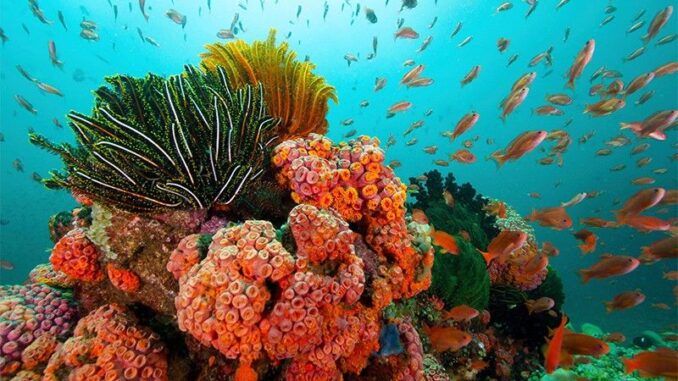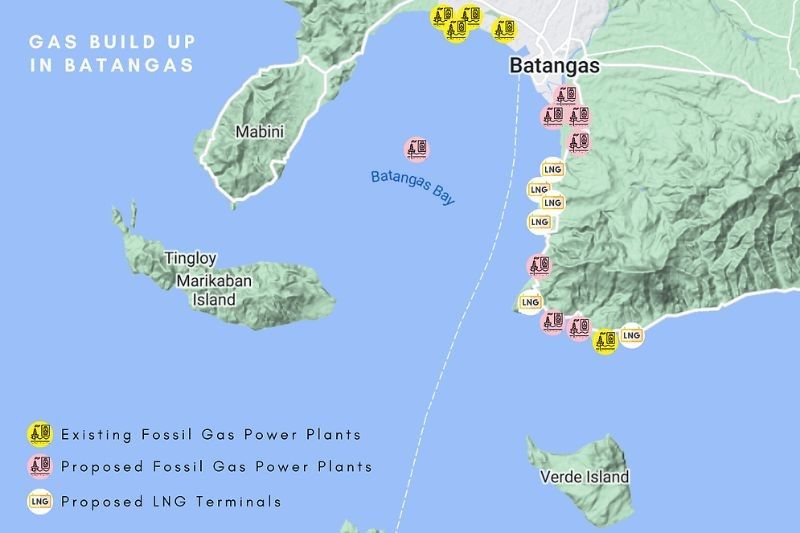
MANILA, Philippines — Fossil fuel expansion projects along the Philippines’ Verde Island Passage, a biodiversity hotspot, were recognized as a case of ecological destruction during an international tribunal session in New York.
During Climate Week in New York, the International Rights of Nature Tribunal convened its sixth session on Sunday, September 22, to explore how countries can strengthen efforts to protect environmental resources, marine ecosystems and wildlife by holding key actors accountable amid an expanding fossil fuel industry.
The Philippines was featured as one of the tribunal’s case studies, as fossil fuel activities threaten the health and safety of communities near the Verde Island Passage. This includes poorer water quality, marine ecology and quality of life.
Advocacy group Protect Verde Island Passage served as a case witness, with its lead convenor, Edwin Gariguez, testifying before the tribunal on the growing dominance of natural gas and liquefied natural gas (LNG) in the Philippines’ economic activities.
“The right of people and nature to water as a source of life, and the right to be free from pollution are being violated by the chemical and thermal pollution from these plants,” Gariguez said.
The advocacy group stated that the Verde Island Passage is home to about 1,736 shore-fish species and around 300 to 500 coral species.
Gariguez noted that its diverse marine life has led scientists to refer to it as the “Amazon of the Oceans.”
With the increase in fossil fuel plants, Gariguez warned of a higher likelihood of intensified shipping activities, freshwater shortages, loss of flora and thermal pollution that disrupts the reproductive processes of marine life.
Affected provinces. The provinces that are most at risk include Batangas, Marinduque, Occidental Mindoro, Oriental Mindoro and Romblon. These are all located in Luzon as the waterway can be found between Batangas and Mindoro, alongside the Mindoro Strait and Tayabas Bay.
Google Maps / Screenshot
The Philippine-Misereor Partnership, Inc. (PMPI), a social development and advocacy network, informed the tribunal of an oil spill in 2023, which impacted over 200,000 people and resulted in environmental and socio-economic damages estimated at P42 billion in the Verde Island Passage.
On March 1, 2023, the MT Princess Empire tanker fully capsized in the Verde Island Passage, spilling 900,000 liters of oil.
“The richness of this biodiversity hotspot is not just a local treasure, it’s not just for the Philippines, but a global asset that we must all strive to protect,” PMPI National Coordinator Yolanda Esguerra said.
Esguerra shared that in recognizing the rights of nature through law, there is a need to look beyond the numbers of those affected as it “does not begin to capture the real-life impacts and violations suffered by local communities and nature.”
Location of gas power plants. Gariguez reported that their organization has identified five operational fossil gas plants and two LNG terminals near the Verde Island Passage, along with over 12 proposed gas power plant projects.
“One cannot even begin to imagine just how catastrophic impacts of fossil fuel expansion of this scale will be for nature and local communities,” he said.
The Protect Verde Island Passage group mapped out both existing and proposed fossil gas power plants, including the proposed LNG terminals, on their website, with several located in Batangas.

Protect Verde Island Passage
Fossil fuel actors. Gariguez and Esguerra identified San Miguel Corporation as one of the key players behind the largest fossil fuel projects in the Philippines.
They also call to hold accountable Linseed Field Power Corporation and Atlantic Gulf & Pacific Company as major contributors to environmental degradation in the at-risk provinces, reporting that these companies had leveled the coastline of two barangays in Batangas.
What the government has done. The Department of Environment and Natural Resources (DENR) signed a memorandum on May 7, 2024 with San Miguel Corporation, Aboitiz Equity Ventures and Metro Pacific Investments Corporation to ensure the conservation of the Verde Island Passage.
The business conglomerates were urged to collaborate with local government units (LGUs), coastal communities and other sectors of society for this purpose.
However, environmental groups and LGUs want the Verde Island Passage to be protected by law and not just by DENR’s word that it is a marine protected area.
At the tribunal, the United States, Mozambique, India and Mexico also presented their testimonies and cases of fossil fuel expansion. Judges providing advice to countries were composed of climate change experts, environmental defenders and advocates.
The International Tribunal plans to hold a second session before the 30th Conference of Parties (COP) to the United Nations Framework Convention on Climate Change (UNFCCC) in Brazil in November 2025.
The UNFCC COP is an international climate summit where world leaders convene annually to craft collaborative solutions in addressing climate change impacts.





Be the first to comment